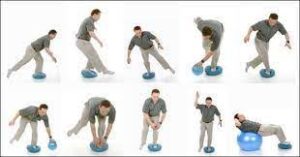Objective: Loss of proprioception and balance disorders are commonly observed in patients with knee osteoarthritis. In this study, we aimed to investigate the effects of balance and proprioception exercises in patients with knee osteoarthritis.
Design: A single-center randomized trial with three parallel arms.
Setting: A tertiary health care facility in Turkey.
Participants: Female patients with knee osteoarthritis aged 40–70 years.

Interventions: Ten-week exercise program in Biodex training, classical balance training and isometric strengthening groups.
Main measures: Dynamic balance (overall stability index and the modified Clinical Test of Sensory Interaction and Balance), pain (visual analogue scale), physical function (30-s chair stand test and 40-meter fast-paced walk test) and quality of life (Knee Injury and Osteoarthritis Outcome Score).
Results: Eighty-nine patients enrolled in the study. The Biodex training group, the classical training group, and the control group had overall stability index values of 1.0 ± 0.07, 1.4 ± 0.07 and 1.4 ± 0.07, and the Modified Clinical Test of Sensory Interaction and Balance – Condition-3 values of 0.7 ± 0.04, 0.9 ± 0.04 and 0.9 ± 0.04 respectively, at the end of treatment. In terms of pain scores on movement, each group showed significant improvement compared to their baseline, and the classical balance training group had better scores than the control group. No other significant difference was found between the groups. Physical function and quality of life outcomes showed significant main effects only in the time factor.
Conclusions: Balance and proprioception exercises may have positive effects on dynamic balance and pain. The effects on physical function and quality of life should be investigated in further studies with larger sample.
Clinical Rehabilitation July 7, 2022 Bugra Ince, Altinay Goksel Karatepe, Seniz Akcay et al
 Blog de Fisioterapia Fisioterapia
Blog de Fisioterapia Fisioterapia



